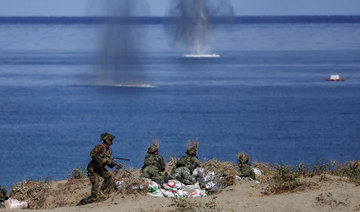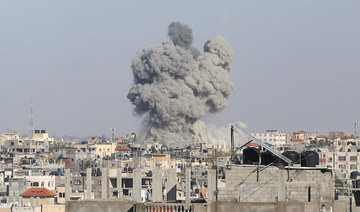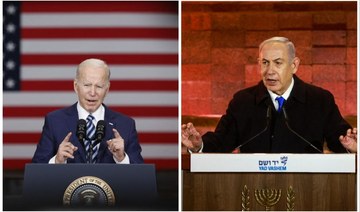KOSTIANTYNIVKA: By the time the Russians invaded, 43-year-old Mufti Said Ismahilov — one of the Muslim spiritual leaders of Ukraine — had already resolved that he would step aside from his religious duties to fight for his country.
At the end of last year, as warnings of an imminent attack grew louder, Ismahilov began training with a local territorial defense battalion. By then he had served as a mufti for thirteen years.
Born and raised in Donetsk in eastern Ukraine, Ismahilov had already fled Russia once before, in 2014, when Moscow-backed separatists captured his city. He eventually moved to a quiet suburb outside Kyiv called Bucha — only to find himself, eight years later, at the heart of Moscow’s assault on Kyiv, and the site of atrocities that shocked the world. It felt as if the threat of Russian occupation would never end.
“This time I made the decision that I would not run away, I would not flee but I would fight” he said in an interview with The Associated Press in Kostiantynivka, a town close to the front lines in eastern Ukraine where a battle for control of the region is intensifying.
Ismahilov began working as a military driver for paramedics evacuating the wounded from front lines or besieged towns. Tasked with driving in highly dangerous conditions, but also emotionally supporting the critically injured, Ismahilov says he sees his new job as “a continuation of my spiritual duty before God.”
“If you are not scared and you can do this, then it is very important. The Prophet was himself a warrior,” Ismahilov says. “So I follow his example and I also will not run, or hide. I will not turn my back on others.”
Ismahilov was one of dozens of Ukrainian Muslims who gathered at the mosque in Kostiantynivka Saturday to mark Eid Al-Adha — an important religious holiday in Islam. The mosque is now the last remaining operational mosque in Ukrainian-controlled territory in Donbas. Ismahilov told the AP that there are around 30 mosques in the region in total but that most are now in the hands of the Russians.
Last week, Russia captured the city of Lysychansk, the last major stronghold of Ukrainian resistance in the eastern province of Luhansk. The governor of the Luhansk region said on Saturday that Russian forces are now pressing toward the border with the neighboring Donetsk region.
Muslims make up almost 1 percent of the population in Ukraine, which is predominantly Orthodox Christian. There is a large Muslim population in Crimea — home to the Crimean Tatars and illegally annexed by Russian in 2014. Numbers there jump to 12 percent. There is also a sizeable Muslim community in eastern Ukraine, the result of waves of economic migration as the region industrialized and many Muslims immigrated to the Donbas region to work in the mines and factories.
The conflict in 2014 forced many Muslims from Crimea and Donbas to relocate to other parts of the country where they joined long-established Tatar communities or built new Islamic centers alongside Turks, Arabs and Ukrainian converts.
But the invasion has forced many to flee once again. The mosque in Kostiantynivka used to cater for a local Muslim population of several hundred people. On Saturday, few local residents were present, having journeyed west with their families. Instead the congregation was made up of soldiers or combat medics from different units: Crimean Tatars and Ukrainian converts from Kharkiv, Kyiv and western Ukraine.
In his sermon following the traditional Eid prayers, Ismahilov told the congregation that this year’s Eid had a symbolic significance in the midst of the war, and asked them to remember Muslims living in occupied territories, where many have lost their homes and several mosques have been destroyed by shelling. Referencing a series of arrests of Crimean Tartars in the wake of the 2014 annexation, Ismahilov said Muslims in occupied territories do not feel safe.
“There is a lot of fear. … The war continues and we have no idea what is happening in the occupied territories and what situation Muslims are in there” he said.
Ismahilov told the AP that he considers Russian Muslims invading Ukraine, including Chechen strongman Ramzan Kadyrov’s infamous Chechen battalions, as “criminals”.
“They are committing sins and … they have come as murderers and occupiers, on a territory that is the home of Ukrainians and Ukrainian Muslims, without any justification. Allah did not give them that right” says Ismahilov. “They will answer for all this before God.”
Olha Bashei, 45, a lawyer turned paramedic from Kyiv who converted to Islam in 2015, says Russia is trying “erase Ukraine from the face of the earth.” Bashei began working as a frontline paramedic in Donbas in 2014. She considers this war her ‘jihad’, a term to denote a holy war or personal struggle in Islam.
“This war is my war, and I defend my jihad because I have nephews, I have a mother and I defend my home. I do not want my nephews to ever see what I, unfortunately, saw in this war” she said.
“Islam even helps me because in Islam, in prayer, you somehow distract yourself from the war because you read the prayer and you have a connection with the Almighty. For me, Islam is a force that supports me even in war.”
As the soldiers prepared the customary sacrificial sheep for the Eid feast, a residential area in Kostiantynivka several kilometers away came under violent shelling. The incoming artillery shook the ground. Some soldiers ran to the mosque’s bunker. Others shrugged it off and continued to drink their tea and eat dates. The shelling caused several fires, injuring several inhabitants and burning roofs to cinders.
Ismahilov said they would pray for victory and the liberation of the occupied territories.
“We pray that our Muslim compatriots will be safe, that our families will be reunited, that the slain Muslims will go to heaven, and that all the Muslim soldiers who are defending their country will be accepted as shahids (martyrs) by Allah.”
Ukraine Muslims pray for victory, end of occupation
https://arab.news/b7wez
Ukraine Muslims pray for victory, end of occupation
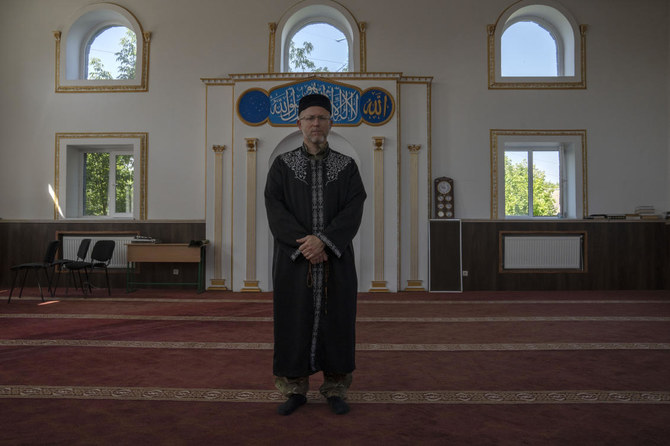
Taiwan must invest in building its own ‘strengths,’ vice president-elect says
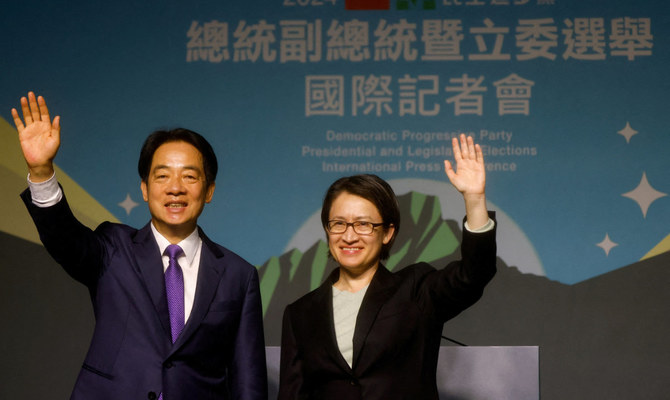
- The United States is Chinese-claimed Taiwan’s most important supporter and arms supplier, despite the lack of diplomatic ties
TAIPEI: Taiwan is grateful for continued US security assistance but must invest in building its own “strengths” first and show the world its support for the island is worth it, Vice President-elect Hsiao Bi-khim said on Monday.
Hsiao, who takes office with President-elect Lai Ching-te on May 20, is Taiwan’s former de facto ambassador to Washington, and is expected to play a key role in further strengthening ties with the United States given her fluent English and deep ties in the US capital.
The United States is Chinese-claimed Taiwan’s most important supporter and arms supplier, despite the lack of diplomatic ties.
Speaking to a think-tank forum, Hsiao expressed appreciation for US President Joe Biden last month signing into law legislation to boost Taiwan’s defenses, part of a broader package of assistance for Ukraine and Israel.
“This bill demonstrates the US’ continuing commitment to supporting allies and partners in the face of geopolitical challenges,” she said.
“But beyond thanking our international friends for their support, it is important that as Taiwanese we invest in building our own strengths first,” she said.
“Through our own efforts in building a resilient Taiwan, we must have the confidence that Taiwan is worthy of galvanizing international support.”
China has ramped up its military pressure against Taiwan over the past four years. Taiwan’s government rejects Beijing’s sovereignty claims.
Hsiao and Lai — who have pledged to continue President Tsai Ing-wen’s defense self-sufficiency and modernization program — take power just months before the US presidential election in November.
Former President Donald Trump, whose administration strongly supported Taiwan and is the presumptive Republican candidate this time round, has said US allies like European members of NATO have to spend more on defense and not just rely on the United States shouldering the burden.
Trump has also been critical of US support for Ukraine following its invasion by Russia.
Rafah invasion ‘must not go ahead’: UK Labour leader
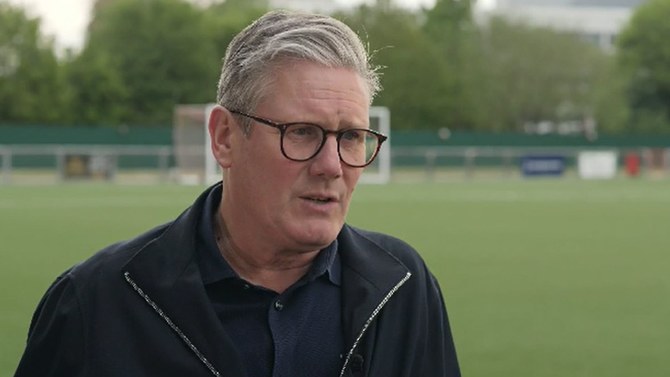
- Keir Starmer calls for ‘immediate ceasefire, release of hostages, unimpeded aid into Gaza’
- Israeli defense minister warns of ‘powerful operation in very near future’
LONDON: An Israeli offensive in the Gazan city of Rafah “must not go ahead,” the leader of the UK’s main opposition Labour Party said on Monday.
Keir Starmer’s comments came after the Israeli military told Palestinian civilians in the area to leave ahead of a planned offensive.
“With more than a million Palestinian civilians sheltering in Rafah, an Israeli offensive must not go ahead,” Starmer wrote on X.
“There must be an immediate ceasefire, the immediate release of all hostages, and unimpeded aid into Gaza that can be delivered regularly, quickly and safely.”
Israeli Defense Minister Yoav Gallant warned on Sunday of “a powerful operation in the very near future in Rafah.”
Starmer was echoed by his Shadow Foreign Secretary David Lammy, who posted on X that an invasion of Rafah “would be catastrophic.”
Shadow International Development Secretary Lisa Nandy warned that people trapped in Rafah “have nowhere else to go.”
So far, at least 34,700 Palestinians have been killed in Gaza since the start of the war last October.
India BJP’s election videos targeting Muslims and opposition spark outrage
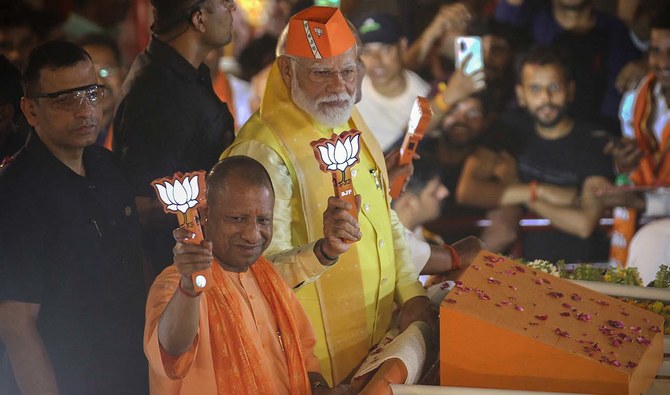
- Videos shared by BJP depict Congress giving disproportionate benefits to Muslims over tribal and Hindu groups
- Manipulated videos have become contentious issue in polls, such as fake videos of top Bollywood stars criticizing Modi
NEW DELHI, May 6 : Animated videos shared by Prime Minister Narendra Modi’s party targeting opposition Congress and the Muslim community have evoked complaints and outrage, as the political climate in India heats up midway through its six-week long election.
The videos, shared by the ruling Bharatiya Janata Party on social media platforms Instagram and X over the last ten days, depict the Congress giving disproportionate benefits to India’s minority Muslim community, at the cost of certain disadvantaged tribal and Hindu caste groups.
The Congress, in a complaint to the poll watchdog Election Commission, said on Sunday that the video has been shared “clearly with an intention to wantonly provocate rioting and promote enmity between different religions.”
A set of guidelines mutually adopted by political parties for how they should conduct themselves during the election period prohibit them from creating “mutual hatred” between caste, religious or linguistic groups.
Manipulated videos on social media have also become a contentious issue in this election, such as fake videos showing top Bollywood stars criticizing the prime minister.
On Monday, the commission warned parties against the misuse of AI tools to create deep fakes and told them not to publish and circulate such videos. It also said parties had been directed to remove such content within three hours of it being brought to their notice.
Modi, the face of the Hindu-nationalist BJP, seeking a rare third consecutive term, had focused his campaign largely on his government’s performance on economic growth and welfare benefits.
But he changed tack after the first phase of voting on April 19 and his campaign speeches have since become more polarizing on religious lines, accusing Congress of planning to redistribute the wealth of the majority Hindus among minority Muslims, who he called “infiltrators” who have “more children.”
The videos shared by the BJP over the last ten days, one of which has since been taken down, illustrated the same message.
A 17-second video shared by a state unit of BJP on May 4, with over 8.5 million views, shows a character resembling Congress leader Rahul Gandhi feeding “funds” to a bird in a skullcap, which eventually pushes out from their common nest three other birds representing other disadvantaged groups.
The Congress has filed a police complaint against BJP leaders for the video, BJP’s head of information and technology Amit Malviya said on X.
“The Congress should in fact thank the BJP for taking their manifesto to the people in a manner that even they couldn’t,” he wrote.
The video has elicited outrage. Nitasha Kaul, a politics professor at London’s Westminster University said on X that the video was a “straightforward 1930s Germany style cartoon.”
In its manifesto for the elections, the Congress has promised to tackle India’s economic inequality by conducting a socio-economic caste census and extending affirmative action. It said it will ensure that minorities receive “their fair share” of education, economic and health care opportunities.
An Election Commission spokesperson, the BJP’s Malviya and Congress spokespersons did not respond to requests seeking comment.
Bangladeshi students rally in solidarity with global student movement against Israel
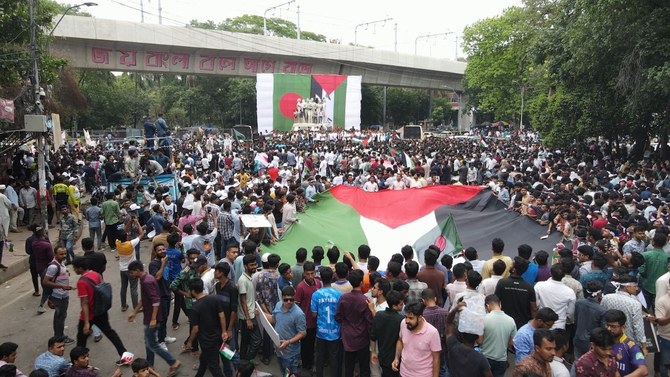
- US student protests have sparked more around the world, including in India, France, Australia
- Dhaka’s thousands-strong rally took place at Bangladesh’s largest, oldest tertiary institution
DHAKA: Thousands of people protesting Israel’s war on Gaza rallied at one of Bangladesh’s top universities on Monday in solidarity with the student-led protests and occupations sweeping the globe.
Pro-Palestinian student leaders and activists from different universities marched and carried flags of Bangladesh and Palestine, chanting slogans in solidarity with Gaza as they made their way to Dhaka University, Bangladesh’s largest and oldest tertiary institution.
Their protest culminated at the symbolic Aparajeyo Bangla sculpture, one of the most well-known landmarks dedicated to the Bangladesh Liberation War of 1971.
“Our stance is very clear: We express solidarity in support of a free Palestine state, in favor of a world free from war. And we support the demands made by US students, like divestment from Israel and other organizations that support the Israeli aggression,” Saddam Hussain, president of the organizing student group Bangladesh Students’ League, told Arab News.
They are also rallying in solidarity with the global student movement, he added.
“We believe all protests hold the same spirit of the youth, be it on the banks of the Atlantic or here on the bank of River Padma,” he said.
“The youths around the world have a common dream, and I urge all of them to move forward to make this dream come true. I hope all the youths of the world will join in this protest to build a world free from war, free and guided with humanitarian spirit.”
The Israeli strikes on Gaza that began in October have killed nearly 35,000 people in the Palestinian territory, mostly women and children. The leader of the World Food Program said over the weekend that parts of the Gaza strip were experiencing a “full-blown famine” that was spreading across the besieged enclave.
Students started to rally or set up tents at various universities around the US last month to protest Israel’s war on Gaza, sparking a global solidarity movement among the youth in India, Australia, France and elsewhere, with many putting pressure on their administrators and governments to cut ties with Tel Aviv.
While US colleges have seen protests since October, the unrest has escalated in recent weeks after police arrested pro-Palestine demonstrators at an encampment in Columbia University, sparking even more campsites at other campuses, as well as more crackdowns and arrests.
Unlike in the US, students in Dhaka were able to protest peacefully with scant police presence.
“The US and some other big players always speak in favor of freedom of speech. But what we have seen in the university campuses in the US is a shame for world leaders,” Solaiman Khan, a 23-year-old Dhaka University student, told Arab News.
“It’s a double standard. We, the youth (of Bangladesh), came out to the streets against this sort of hypocrisy from the superpowers of the world.”
Khan said the violence against Palestinians must be “stopped now and forever.”
“We have seen enough atrocities done by the Israeli forces. How many more lives must the world lose? Is it not enough?” he said.
“I think world leaders should come to their senses and act more rationally in stopping the atrocities in Gaza orchestrated by the occupying Israeli forces. Now is the time to play a decisive role. Otherwise, the next generation will not forgive us.”
Pro-Palestine Oxbridge students set up encampments

- They are demanding transparency about the universities’ financial links to Israel
- ‘We will not move until our demands are met’
LONDON: Students at the universities of Oxford and Cambridge have set up encampments in support of Palestine, The Times reported on Monday.
Around 50 have refused to leave the lawn of King’s College, Cambridge, while students have also declared a “liberated zone” outside Oxford’s Pitt Rivers Museum.
A banner hung outside King’s College read: “Welcome to the people’s university for Palestine.” Chants of “stop the bombing now” have also been heard on the campus.
The protests have been organized by Oxford Action for Palestine and Cambridge for Palestine.
They are demanding transparency about the universities’ financial links to Israel, which they have described as a “settler colonial state,” and are calling for the end of all investments and endowments from Israeli and Israel-linked companies.
“We have set up camp in university grounds, and we will not move until our demands are met,” the groups said in a statement, adding that the universities are legitimate targets for protests because of their “role in the British empire and its disastrous colonial legacies.”
The Times reported that protesters had been given an itinerary for their involvement including “de-escalation training” and “banner-making.”
A spokesperson for Cambridge University said it is for the college to decide whether to call the police, adding: “The university is fully committed to academic freedom and freedom of speech within the law and we acknowledge the right to protest.
“We ask everyone in our community to treat each other with understanding and empathy. Our priority is the safety of all staff and students.
“We will not tolerate antisemitism, Islamophobia and any other form of racial or religious hatred, or other unlawful activity.”
The relatively small UK protests come after nearly 2,000 people were arrested across the US after widespread demonstrations on over 130 American university campuses about Israel’s ongoing war in Gaza.




